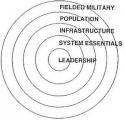The solution is smaller dams that are easier to maintain and allow melted snow and rainwater to pool in more places and seep into the ground, raising the water table.
The dams, ranging from one to three feet in height, will be easier for villagers to clean and maintain, said Joyce, who before joining the Army worked as a ranch manager in western Oregon.
Watershed management is one of many projects undertaken by the ADT soldiers, who arrived in eastern Afghanistan in March as part of the U.S. military’s effort to stabilize farming, the country’s main source of subsistence and income. Roughly 85 percent of the nation’s inhabitants are farmers.
The state of Indiana has pledged to supply National Guard units for five years to maintain continuity in the effort, officials said. The 1-19th is the first.
By stabilizing the farming industry, and enabling farmers to not only survive but eventually profit, officials hope to give military-age men alternatives to fighting alongside the anti-government forces, which in the province include the Taliban, al-Qaida and the Haqqani network.
The handpicked teams of guardsmen are specialists in agribusiness, including farming, ranching and business practices, and will help Afghans with, among other things, forestry, agronomy, horticulture, range land management and animal husbandry, said Maj. Ron Crane, the educational director. He recently hosted a "train the trainer" session for Afghan extension agents.






 If you get the water....you get the food. These are Strategic targets of the highest order they determine whether a population will live or die regardless of what belief they system is.
If you get the water....you get the food. These are Strategic targets of the highest order they determine whether a population will live or die regardless of what belief they system is.





Bookmarks